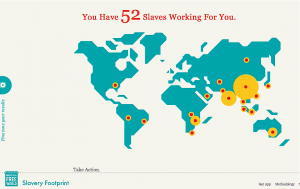Sweatshops
WE LIVE IN AN AGE of “market morality”: In our market system, we believe that money grants value and meaning to the moral and social questions of life. It doesn’t. Nevertheless, we’re under its spell.
Market morality interprets life in economic terms. For instance, many corporations do not believe they have a moral duty to vulnerable communities affected by their business practices. Instead, they assert that their primary duty is their fiduciary responsibility to shareholders and other stakeholders in the company. In this case, the moral domain of corporate practice is about securing profit returns to the exclusion of broader social and communal practices of care.
We have witnessed, repeatedly, poor communities and their environments polluted by toxins associated with corporate practices. This is readily seen in the Flint, Mich. water crisis, which persists. These companies offer no apologies, because their moral obligations are defined in economic terms, shaped by the bottom line of profit.
 The Slavery Footprint campaign launched Thursday (Sept. 22), which also happened to have been the 149th anniversary of the Emancipation Proclamation, with the goal of personalizing "the issue of modern slavery by providing people with an assessment of just how much their lifestyle depends on forced labor -- and the steps they can immediately take to help end it."
The Slavery Footprint campaign launched Thursday (Sept. 22), which also happened to have been the 149th anniversary of the Emancipation Proclamation, with the goal of personalizing "the issue of modern slavery by providing people with an assessment of just how much their lifestyle depends on forced labor -- and the steps they can immediately take to help end it."
By following this LINK I was able to plug in some basic information about myself and my lifestyle -- where do I live, do I own or rent, how many children do I have, have many diamonds/leather shoes/electronic gizmos do I own, what are my eating habits, what's in my medicine cabinet, etc., -- and in just a few minutes received the upsetting news that, according to the Slavery Footprint campaigns diagnostics, 52 slaves "work for me."
Bumper stickers found in many college dormitories and church parking lots during the recent boycott of Taco Bell featured a Spanish-speaking Chihuahua—playing off the chain’s ads—turning down the fast- food chow to demand a penny more per pound for tomato pickers.
Heading the campaign was the Coalition of Immokalee Workers, a farm worker-led organization based in Immokalee, Florida, with more than 2,500 members, most of whom are Latinos, Haitians, and Mayan Indians. The nearly four-year boycott put worker concerns—low wages, poor working conditions, and discrimination—in front of many consumers and led to an agreement with Yum! Brands, Taco Bell’s parent company.
The campaign is one of several recent examples of tapping into the power of consumers. Through education, boycotts, and other methods, farm workers can make those who eat the products they grow and pick aware of the conditions they experience—and ask for their help in changing those conditions.
“The life of an agricultural worker is one of exploitation,” said Lucas Benitez, a worker and organizer with the coalition who came to the U.S. from Mexico as a teenager. Farm laborers work long hours, with no benefits, health care, or overtime pay, he said. “The imbalance of power is tremendous.”
The agreement reached by the coalition and Yum! Brands established important precedents of increasing wages coming down the supply chain and involving workers in the monitoring of conditions in the fields, said Brigitte Gynther, an organizer with the coalition. The change for workers has been immediate, Benitez said, after more than 20 years of receiving the same salary. Each week, he said, “depending on how much they harvest, they receive between $15 and $40 more.” Also essential, Gynther said, are the safeguards against what the coalition believes to be inhumane working conditions the pickers have suffered.
Since its founding in 1994, the People of Faith Network has organized targeted campaigns to educate religious people about the conditions under which the clothes they buy are made.

